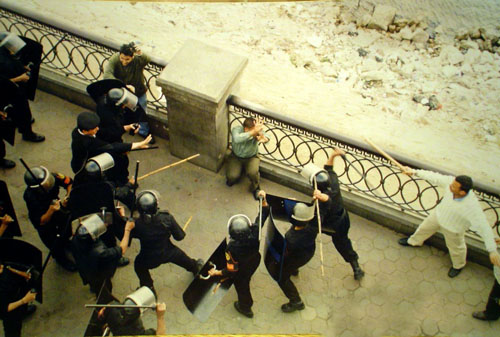Arab Sting: Canada stays quiet about Egyptian military repression
Arab Sting: Canada stays quiet about Egyptian military repression

The military-backed interim government that emerged in Egypt in 2013 has committed an innumerable amount of atrocities. The Egyptian military is using torture as a means of intimidation, and they have imposed extreme levels of censorship on the media. Under the leadership of Interim President Adly Mansour, a judge has sentenced 683 alleged Muslim Brotherhood supporters to death, and the military continues to imprison journalists. They have also taken several news stations off the air. While the Egyptian government has been committing human rights violations, Canada has turned a blind eye, while making supportive comments about the new interim leadership.
During Stephen Harper’s visit to Israel in January 2014, he participated in a Q&A session at Tel Aviv University after receiving an honorary doctorate. When asked to comment about recent political upheavals in the Middle East, Canada’s Prime Minister stated that Western countries who supported the Arab Spring with “unbridled enthusiasm” should be “chastened” for what essentially led to what he calls ex-president Mohamed Morsi’s “authoritarian, Islamic state.”
In January 2014, Amnesty International reported “1400 people had been killed in political violence since July 2013.” The military took power after Morsi’s ouster in July 2013, instating a new law banning public protests in November 2013. Harper, however, has made sympathetic statements about this new interim regime. In fact, during his talk in Tel Aviv, he “welcomed the return to stability” in Egypt. As he uttered those words, two Canadians continued to languish behind bars in an Egyptian prison.
On December 29th 2013 Mohamed Fahmy, a Canadian journalist working for Al Jazeera and a 2014 recipient of the press freedom award, was detained by Egyptian authorities. For a little over a month, the military kept him in solitary confinement where he was denied medical aid for a severe shoulder injury. He still remains in jail and the Egyptian state has charged Fahmy with “terrorism-related offences.” Fahmy has pleaded not guilty.
The Egyptian state has censored Qatar-based broadcaster Al Jazeera for its alleged sympathy toward the Muslim Brotherhood, which is now outlawed as a terrorist organization. Journalists who have referenced interviews with Brotherhood members have been charged with broadcasting news that is “damaging to national security,” as in Fahmy’s case. The Canadian government has only been providing Fahmy with consular services, and urging the interim government to recognize the freedom of the press. They have called for a fair trial for Fahmy, but now that the Al Jazeera journalists’ lawyers must pay £100,000 to view evidence against the journalists, the likelihood of a fair trial is improbable.
When asked whether they will urge the Egyptian authorities to respect freedom of the press, the Minister of State for Foreign Affairs and Consular Services, Lynne Yelich stated “Canada stands with the Egyptian government and people in their efforts to build a stable, inclusive, prosperous, and democratic Egypt.” However, it is much easier to find evidence of Canada’s silence in the military government’s abuses than it is to demonstrate that Canada is encouraging democracy in Egypt.
Khaled Al-Qazzaz, a Canadian permanent resident who was part of ex-President Morsi’s campaign team has also been forcibly detained since July 2013. The Canadian government is not providing him with consular services, but says they are in contact with the local authorities.
With upcoming Egyptian elections, Foreign Affairs Minister John Baird has made encouraging remarks about “the possibility of sending election observers from Canada.” However, the Egyptian state’s censorship and intimidation has instilled a climate of fear among those opposing the military. Potential candidates have already dropped out due to “the impossibility of campaigning in an environment where opposition is portrayed as treason.” Earlier this month, Egypt’s most popular presidential candidate Abdel-Fattah el- Sisi told the press that democracy is idealistic, and that people should not be demonstrating for political reforms.
In April 2014, Baird paid Cairo a visit for the Canada Egypt Business Council meeting. In an interview with the Ottawa Citizen, Baird claimed his visit was to “signal support for the country during the transition to democracy.” However, Egypt remains strategically important in the Middle East. It is home to the Suez Canal, and is a key player in maintaining stable relations with Israel. With a nearly 12% increase in Canadian exports to Egypt from 2012 to 2013, there’s no doubt that the Conservative government agrees with the Canada Egypt Business Council’s assessment that the meeting “foster[s] growth in business interests between Canadians and Egyptians.”
21,317 Egyptians have been arrested since Morsi’s ouster, and Canada’s inaction and sympathetic comments toward the interim regime are a clear signal that when it comes to foreign policy, geopolitics and commercial interests take precedence over human rights. In Egypt, Canada’s support for democracy has remained almost entirely in the realm of rhetoric.

